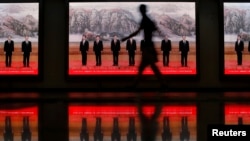BEIJING —
China's politburo, the country's top decision-making body, pledged on Tuesday to keep economic growth stable in the second half by fine-tuning policies, while pressing ahead with reforms and restructuring, the official Xinhua news agency said.
A meeting of the body, presided over by President Xi Jinping, was the first since official data showed economic growth slowed to 7.5 percent in the second quarter from 7.7 percent in the first three months of 2013.
Tuesday's comments were the latest in series by top leaders affirming their policy stance for the world's second-largest economy, which has slowed in nine of the past 10 quarters.
"The central authorities will continue to coordinate the multiple tasks of stabilizing growth, restructuring the economy and promoting reforms," Xinhua said, citing a statement released after the politburo meeting.
China's economy faces "extremely complicated domestic and international conditions," the leadership concluded, according to Xinhua.
Top leaders have made clear they will accept a slowdown in growth to push attempts to restructure the economy away from dependence for growth on exports and manufacturing, and towards one driven by consumption and services.
However, they have indicated that annual growth should not be allowed to slip below 7 percent.
"We should grasp the direction, intensity and rhythm of macro-controls to keep the economic performance within in a reasonable range," the politburo said.
While the statement reaffirmed current fiscal and monetary policies, it said that "based on changes in the economic situation, we will pre-emptively fine-tune policies in a timely way and increase financial support for the real economy."
'Human-centered' urbanization
The government will also push "human-centered" urbanization and promote stable and healthy development of the real estate sector, it added.
China plans to bring 400 million people to its cities over the next decade. The country will steadily loosen its rigid residence registration, or hukou, system that keeps people from getting access to basic welfare services outside their official residence area.
Analysts in a Reuters poll have forecast China's annual GDP growth will slow to 7.4 percent in the third quarter before stabilizing in the final quarter of 2013. Full-year growth is forecast at 7.5 percent, in line with the official target.
The State Council, China's cabinet, has pledged to increase investment in affordable housing for poor families. It has also announced policies to support small- and medium-sized enterprises as well as efforts to speed up development in energy-saving industries and the telecoms sector.
Leaders are expected to hold the third plenum of the 18th Central Committee of the Communist Party of China in October to set their economic agenda for the next decade. The plenum may also include some political reform.
Historically, third plenums have been a springboard for key changes in China. One such session, in the 1990s, spawned sweeping economic reforms introduced by then-Premier Zhu Rongji.
A meeting of the body, presided over by President Xi Jinping, was the first since official data showed economic growth slowed to 7.5 percent in the second quarter from 7.7 percent in the first three months of 2013.
Tuesday's comments were the latest in series by top leaders affirming their policy stance for the world's second-largest economy, which has slowed in nine of the past 10 quarters.
"The central authorities will continue to coordinate the multiple tasks of stabilizing growth, restructuring the economy and promoting reforms," Xinhua said, citing a statement released after the politburo meeting.
China's economy faces "extremely complicated domestic and international conditions," the leadership concluded, according to Xinhua.
Top leaders have made clear they will accept a slowdown in growth to push attempts to restructure the economy away from dependence for growth on exports and manufacturing, and towards one driven by consumption and services.
However, they have indicated that annual growth should not be allowed to slip below 7 percent.
"We should grasp the direction, intensity and rhythm of macro-controls to keep the economic performance within in a reasonable range," the politburo said.
While the statement reaffirmed current fiscal and monetary policies, it said that "based on changes in the economic situation, we will pre-emptively fine-tune policies in a timely way and increase financial support for the real economy."
'Human-centered' urbanization
The government will also push "human-centered" urbanization and promote stable and healthy development of the real estate sector, it added.
China plans to bring 400 million people to its cities over the next decade. The country will steadily loosen its rigid residence registration, or hukou, system that keeps people from getting access to basic welfare services outside their official residence area.
Analysts in a Reuters poll have forecast China's annual GDP growth will slow to 7.4 percent in the third quarter before stabilizing in the final quarter of 2013. Full-year growth is forecast at 7.5 percent, in line with the official target.
The State Council, China's cabinet, has pledged to increase investment in affordable housing for poor families. It has also announced policies to support small- and medium-sized enterprises as well as efforts to speed up development in energy-saving industries and the telecoms sector.
Leaders are expected to hold the third plenum of the 18th Central Committee of the Communist Party of China in October to set their economic agenda for the next decade. The plenum may also include some political reform.
Historically, third plenums have been a springboard for key changes in China. One such session, in the 1990s, spawned sweeping economic reforms introduced by then-Premier Zhu Rongji.





